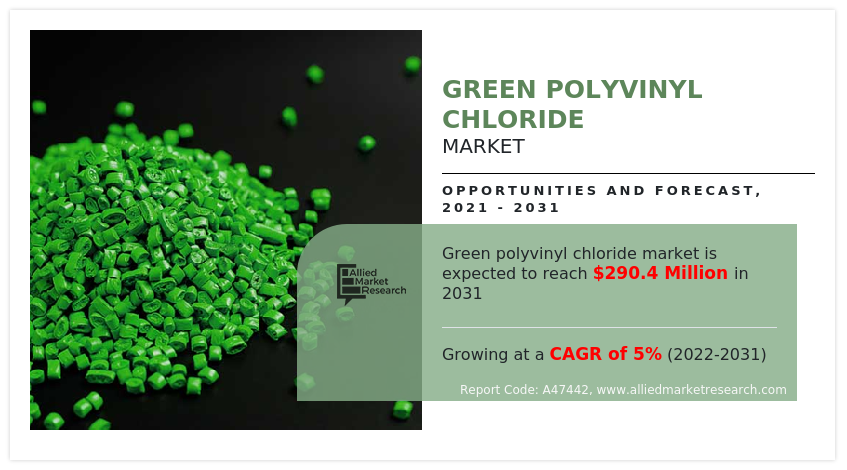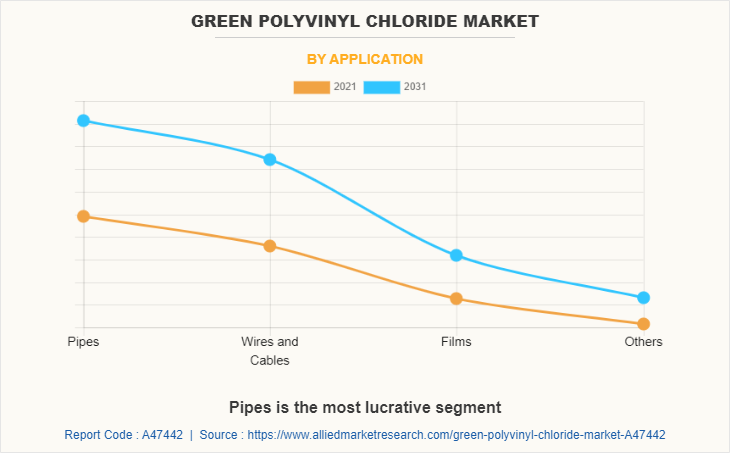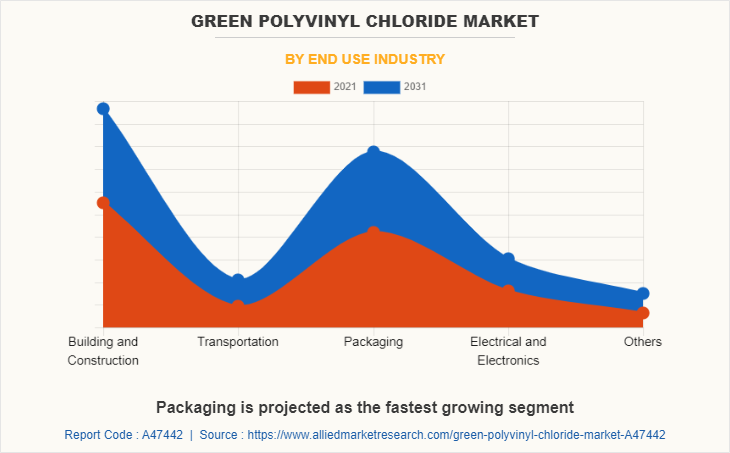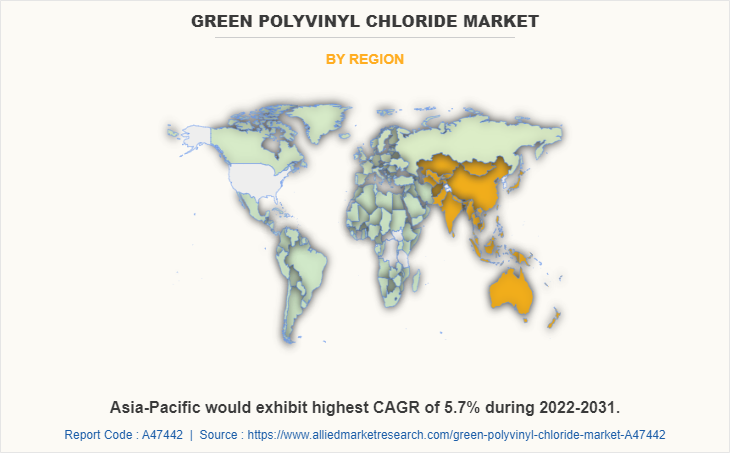Green Polyvinyl Chloride Market Research, 2031
The global green polyvinyl chloride market was valued at $179.2 million in 2021, and is projected to reach $290.4 million by 2031, growing at a CAGR of 5.0% from 2022 to 2031.
Report Key Highlighters
- The green polyvinyl chloride market is consolidated in nature among companies such as Vynova group, GERMANCARD Technologies GmbH, LG Chem Ltd, Westlake Vinnolit GmbH And Co. KG, GEON, Schilling Ltd., Sylvin Technologies, Inc., and INEOS that hold significant share in the market.
- The study contains qualitative information such as the market dynamics (drivers, restraints, challenges, and opportunities), Porter’s Five Force Analysis, key regulations across North America, Europe, Asia-Pacific, LAMEA regions, and value chain analysis.
- Latest trends such as development of bio-based polyvinyl chloride from sustainable sources, R&D in green polyvinyl chloride industry, and value chain analysis, in global green polyvinyl chloride market is analyzed across 19 countries in 4 different regions.

Green polyvinyl chloride is produced from non-food-based biomass or renewable ethylene instead of traditional fossil fuel feedstocks. It is an eco-innovation in the conventional plastic industry. Green polyvinyl chloride finds applications in various end use sectors including building & construction, electrical & electronics, packaging, medical, automotive, transportation, and others.
Surge in population base has led to rapid urbanization in both developed and developing economies such as the U.S., China, India, and others. This has increased government spending on building & construction sector to develop various upcoming infrastructure projects. For instance, according to a report published by National Investment Promotion and Facilitation Agency, the infrastructure activities accounted for 13% share of the total foreign direct investment (FDI) inflows in 2021. Furthermore, rapid development of water supply, sanitation, urban transport, schools, and healthcare are aiding the growth of the building & construction sector.
The increase in construction of green buildings, ecotel, and others has surged the demand for bio-based polyvinyl chloride (PVC) plastic materials such as pipes, cables, window profiles, flooring and roofing, and others. Moreover, green polyvinyl chloride makes a major contribution to the quality, safety and cost-effectiveness of construction materials, as well as contributing to lower environmental impacts of construction projects. These factors together may fuel the demand for green polyvinyl chloride market in the growing construction sector.
Moreover, one of the greatest advantages of green polyvinyl chloride (PVC) is that it can be manufactured from renewable sources. The common feedstocks used for the production of green polyvinyl chloride are renewable ethylene, biomass, and others. These are easily available in almost every geographical region across the globe. Hence, the crude oil price fluctuation in the global market does not affect the growth of the green polyvinyl chloride industry.
However, the cost involved the formulation of green polyvinyl chloride (PVC) is high that results in expensive final product. Furthermore, green PVC are relatively expensive as compared to synthetic PVC. In addition to this, the production of green polyvinyl chloride (PVC) requires skilled workforce. These factors altogether may retrain the growth of the green polyvinyl chloride market during the forecast period.
On the contrary, companies are moving toward sustainable and eco-friendly alternatives for developing and strengthening their brand image with rise in environmental concerns among consumers. For instance, leading companies, such as Coca Cola and Finolex, Aramco, PepsiCo, focus on the use of bio-based polyvinylchloride and other plastic materials for piping, transportation, beverage packaging, and other applications. Thus, the increase in CSR activities of the companies is projected to fuel the green polyvinyl chloride and promote the investor’s interest toward the green/bio-based polyvinyl chloride industry.
The green polyvinyl chloride market is segmented into application and end use, and region. On the basis of application, the market is categorized into pipes, wires and cables, films, and others. On the basis of application, it is divided into building & construction, transportation, packaging, electrical and electronics, and others. Region-wise, the market is studied across North America, Europe, Asia-Pacific, and LAMEA.

In 2021, the pipes segment was the largest revenue generator, and is anticipated to grow at a CAGR of 5.0% during the forecast period. The increase in urbanization in both developed and developing economies have led both state and municipal governments to increase their spendings on building drainage systems wherein green polyvinyl chloride (PVC) pipes are widely used for underground drainage applications. This may act as one of the key drivers responsible for the growth of the green polyvinyl chloride market.
Furthermore, increase in awareness for sustainability has led the industrial sector to become more linear toward using eco-friendly products which in turn has promoted the use of green PVC pipes in piping, transportation, and other applications. Moreover, programs launched by governments of various countries such as Green Industry Initiative by United Nations Industrial Development Organization (UNIDO), Sustainable Industrial Development, Eco-industrial Development, and others have also aided the growth of the green PVC among industrial sector.

By end use, the building and construction application segment dominated the global market in 2021, and is anticipated to grow at a CAGR of 5.1% during forecast period. Surge in population led the building & construction sector to witness a significant growth where green polyvinyl chloride (PVC)-based pipes, tubes, wires and cables, and other products are widely used for different applications in building & construction sector. For instance, according to a report published by International Trade Administration, China’s construction industry is projected to grow at an annual average rate of 8.6% from 2022 to 2030. This may propel the demand for green polyvinyl chloride in the growing construction sector during the forecast period.
In addition, government of developing economies such as China, India, and others has increased spending on the development of townships, housing, built up infrastructure and construction development projects where green polyvinyl chloride is widely used for manufacturing piping systems, underground sanitation, and others. For instance, according to a report published by National Investment Promotion and Facilitation Agency of India, the Indian Parliament passed a bill to set up the National Bank for Financing Infrastructure and Development (NaBFID) to fund infrastructure projects in India in March 2021. This event is expected to open lucrative opportunities for the green polyvinyl chloride market in the building & construction sector.

The Asia-Pacific green polyvinyl chlorides market size is projected to grow at the highest CAGR of 5.7% during the forecast period and accounted for 46.0% of green polyvinyl chlorides market share in 2021. Rise in building & construction, transportation, industrial, electrical & electronics, and other sectors have enhanced the performance of the green polyvinyl chloride market in the Asia-Pacific region. China's consumer electronics sector is increasing rapidly which in turn has enhanced the performance of the green polyvinyl chloride market in the region.
According to a report published by the United Nations Statistics Division, China witnessed around 28.7% of the global manufacturing output for consumer electronic products in 2019. Also, countries such as India and Australia are witnessing a rapid increase in transportation sectors where green polyvinyl chloride is employed for producing various shock absorbing vehicle components such as soft dashboards, airbag fabrics (coated with PVC), and others. For instance, according to a report published by the Indian Ministry of Commerce and Industry, the transportation sector in India is expected to grow at a compound annual rate (CAGR) of 5.9% by 2025 owing to the development of highways, widespread railway networks, aviation ports, and waterways structure. This may enhance the performance of the green polyvinyl chloride market in the Asia-Pacific region.
Europe accounted for the second largest share in the global polyvinyl chloride market, growing at a CAGR of 4.7%. Germany is the most promising country-level market in the region with increased adoption of green polyvinyl chloride in the automotive & transportation sector. According to a report published by Germany Trade and Invest, Germany has witnessed an increased consumer demand for private and public vehicles with electric vehicles giving an additional push to the transportation industry. Also, the region has a strong presence of key automobile leaders such as Mercedes-Benz, Bayerische Motoren Werke Aktiengesellschaft (BMW), Audi, and others which are consistently adding value by producing highly advanced vehicles. This may enhance the performance of the green polyvinyl chloride used for producing various shock absorbing vehicle components such as soft dashboards, airbag fabrics (coated with PVC), and others.
Furthermore, countries such as the UK and Italy have put more emphasis on building & construction activities where green polyvinyl chloride is used in pipes, cables, window profiles, flooring and roofing, and others. According to a report published by Construction Product Association, the construction output increased by 12.9% in 2021 and is projected to increase by 5.2% in 2022. This may enhance the performance of the green polyvinyl chloride market in the European region.
The global green polyvinyl chloride market profiles leading players that include Vynova group, GERMANCARD Technologies GmbH, LG Chem Ltd, Westlake Vinnolit GmbH and Co. KG, GOLDSTAB ORGANICS PVT LTD, GEON, Schilling Ltd., V. V. HITECH INNOVATIONS INDIA PRIVATE LIMITED, Sylvin Technologies, Inc., and INEOS. The global green polyvinyl chloride market report provides in-depth competitive analysis as well as profiles of these major players.
Key Benefits For Stakeholders
- This report provides a quantitative analysis of the market segments, current trends, estimations, and dynamics of the green polyvinyl chloride market analysis from 2021 to 2031 to identify the prevailing green polyvinyl chloride market opportunities.
- The market research is offered along with information related to key drivers, restraints, and opportunities.
- Porter's five forces analysis highlights the potency of buyers and suppliers to enable stakeholders make profit-oriented business decisions and strengthen their supplier-buyer network.
- In-depth analysis of the green polyvinyl chloride market segmentation assists to determine the prevailing market opportunities.
- Major countries in each region are mapped according to their revenue contribution to the global market.
- Market player positioning facilitates benchmarking and provides a clear understanding of the present position of the market players.
- The report includes the analysis of the regional as well as global green polyvinyl chloride market trends, key players, market segments, application areas, and market growth strategies.
Green Polyvinyl Chloride Market Report Highlights
| Aspects | Details |
| Market Size By 2031 | USD 290.4 million |
| Growth Rate | CAGR of 5% |
| Forecast period | 2021 - 2031 |
| Report Pages | 245 |
| By Application |
|
| By End Use Industry |
|
| By Region |
|
| Key Market Players | LG Chem Ltd, INEOS, V. V. HITECH INNOVATIONS INDIA PRIVATE LIMITED, GOLDSTAB ORGANICS PVT LTD, GERMANCARD Technologies GmbH, vynova group, Westlake Vinnolit GmbH & Co. KG, Schilling Ltd., Sylvin Technologies, Inc., GEON |
Analyst Review
According to CXOs of leading companies, the global green polyvinyl chloride market is expected to exhibit high growth potential. Green polyvinyl chloride is used in producing pipelines, films, wires & cables, and others that find application in a variety of end-use sectors such as building & construction, transportation, industrial, and others. Transportation and industrial equipment that require high strength, corrosion protection, and fire resistance properties can be accomplished with the use of green polyvinyl chloride.
In addition, green polyvinyl chloride possesses excellent significant properties such as high mechanical strength, thermal resistance, chemical resistance, and corrosion resistance that makes it best suited for producing a wide range of automotive parts. Moreover, it serves as a protective flame retardant coating in life saving vehicle airbags. Furthermore, factors such as flexibility in operation, ease of application, and minimal or no volatile organic compounds (VOCs) levels enhance performance of green polyvinyl chloride in several end-use industries. CXOs further added that sustained economic growth and increasing utilization of sustainable materials in building & construction sector have increased the popularity of green polyvinyl chloride.
Environment-friendly properties, renewable raw material sources, increase in demand from building and construction sector, and robust demand from automotive and transportation sector are the upcoming trends in the green polyvinyl chloride market.
Pipes is the leading application in the green polyvinyl chloride market.
Asia-Pacific is the largest regional market for green polyvinyl chloride market.
The green polyvinyl chloride market valued for $179.2 million in 2021 and is estimated to reach $290.4 million by 2031, exhibiting a CAGR of 5.0% from 2022 to 2031.
Yop companies that hold significant share in the green polyvinyl chloride market includes Vynova group, GERMANCARD Technologies GmbH, LG Chem Ltd, Westlake Vinnolit GmbH and Co. KG, GOLDSTAB ORGANICS PVT LTD, GEON, Schilling Ltd., V. V. HITECH INNOVATIONS INDIA PRIVATE LIMITED, Sylvin Technologies, Inc., and INEOS.
Loading Table Of Content...



